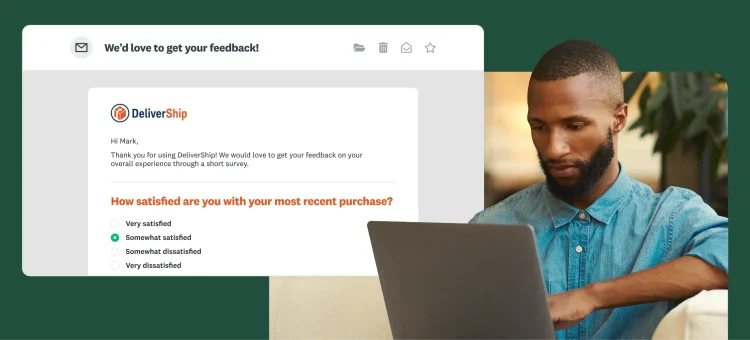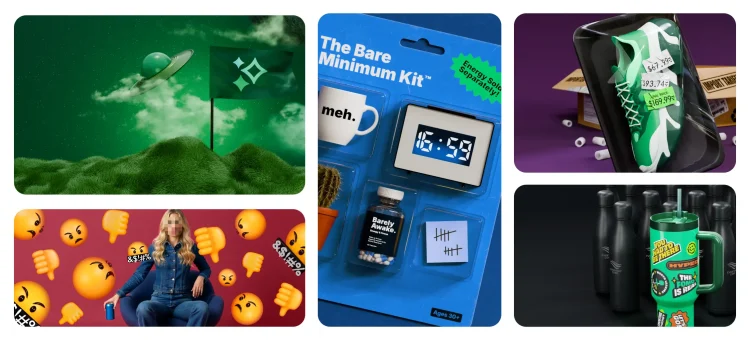The marketing team at Elephant Insurance, an American branch of UK auto company Admiral Insurance with a presence in 8 states, knows the power of customer feedback and surveys in building a brand. Targeting younger drivers and focused on the digital experience, Elephant Insurance has used surveys as a brand tracker, to gauge awareness and sentiment throughout its 10-year history.
Elephant was using Qualtrics as the company’s brand tracker. However, marketing team leader Jacob Wright (whose internal nickname is “the sultan of surveys”) began to feel a disconnect between the platform’s experience and the Elephant Insurance brand.
“The results we’d get from awareness surveys skewed to an older population, which affected the perception and sentiment results we had available for the brand tracker,” Wright said. In addition to a price point that didn’t allow the team to conduct frequent surveys, the lack of specific audience targeting left the marketing team worried they were missing key insights about their efforts.
Building brand awareness in new designated marketing areas
Wright began a search for a new platform that would enable the marketing and brand teams to better pinpoint specific designated marketing areas (DMAs), particularly those the company is targeting for expansion. Wright uses the brand tracker to dive into specific topics, including perception among men versus women in a certain DMA, awareness among drivers in multi-car families, specific income levels, and more.
In addition, the ability to scale surveys for specific audiences, especially the younger demographic Elephant Insurance caters to, is vital in making the brand tracker relevant and applicable.
“The tracker is how we validate the strategy and choices we make in marketing.”
After reviewing multiple platforms, Elephant landed on SurveyMonkey as its new solution. Wright felt a personal connection with the SurveyMonkey support team, and the lower price point and detailed audience segmentation sealed the deal. “We decided to move forward for the cleaner tools, better demographic cutting for filtering, and probably most importantly—better price,” he explained.
Segmenting responses for immediately applicable insight
Switching to a lower cost platform allowed Wright's team to launch weekly surveys, twice the amount as their previous bi-weekly cadence. This additional feedback provided greater insight into subtle changes in perception, an important aspect of deciding whether new marketing campaigns should be paused or not. “With access to weekly insights, we’re able to give initiatives more time if we see there might be value that’s not surface level yet,” Wright said.
The weekly surveys are built around questions that uncover awareness of the company’s offerings, perception of various insurance carriers, and the respondent’s intention to request a quote from Elephant Insurance. Wright uses SurveyMonkey to funnel respondents through different question avenues based on their responses, and tracks insights in a weekly dashboard. Of particular importance is the platform’s ability to segment respondents in multiple demographic categories.
These weekly dashboards are shared with the executive team to showcase recent insights and how things are trending in the long term. Wright said the reports validate the marketing team’s efforts and are instrumental in proving the value of initiatives. Since switching to SurveyMonkey, the team has seen several instances where better access to perception data translated to more informed decisions and ultimately a return on investment.
Validating marketing strategy through audience awareness
At the company's headquarters in Richmond, Virginia, Elephant Insurance already had fairly strong awareness. According to Wright, awareness can be a “difficult needle” to move. The company purchased spots on a number of billboards in the area to see if this form of marketing would result in an aided awareness spike. Using SurveyMonkey, the team was able to sample specific audiences in the area and gauge changes in perception and awareness.
At the end of three weeks, Elephant Insurance saw increases in aided awareness and brand trust, and a decrease in risk. They also uncovered a significant spike in intent to quote numbers.
“SurveyMonkey helped us solidify that we were doing the right thing strategically.”
Wright noted a similar story with a television ad campaign in Indianapolis, Indiana. He said insurance can be a “sluggish” industry in terms of consumers taking action after seeing advertising, making it hard to justify continuing an ad spend when new sales aren’t coming in. The company was considering ending its television ads after 2 weeks—until results from surveys shifted the course.
“We noticed that the aided awareness report jumped significantly in those weeks,” he said. The marketing team was able to catch early positive signs, keep the ad spots live, and continue growing awareness.
As the Elephant Insurance marketing team looks to the future, Wright notes the long-term effect that COVID-19 may have on consumer behavior. He sees increased opportunities to send ad hoc surveys covering timely, targeted questions affecting both current and potential expansion markets.
“These types of surveys can give us a barometer of what messages are resonating so we can move forward with confidence,” Wright said. “There’s both quantitative and qualitative applications—these surveys and numbers give us more guidance than focus groups.”
Looking for a better way to keep a pulse on consumer sentiment and awareness? Learn more about SurveyMonkey Audience.
Learn more about brand tracking
Discover how to track your marketing efforts with SurveyMonkey market research solutions.



